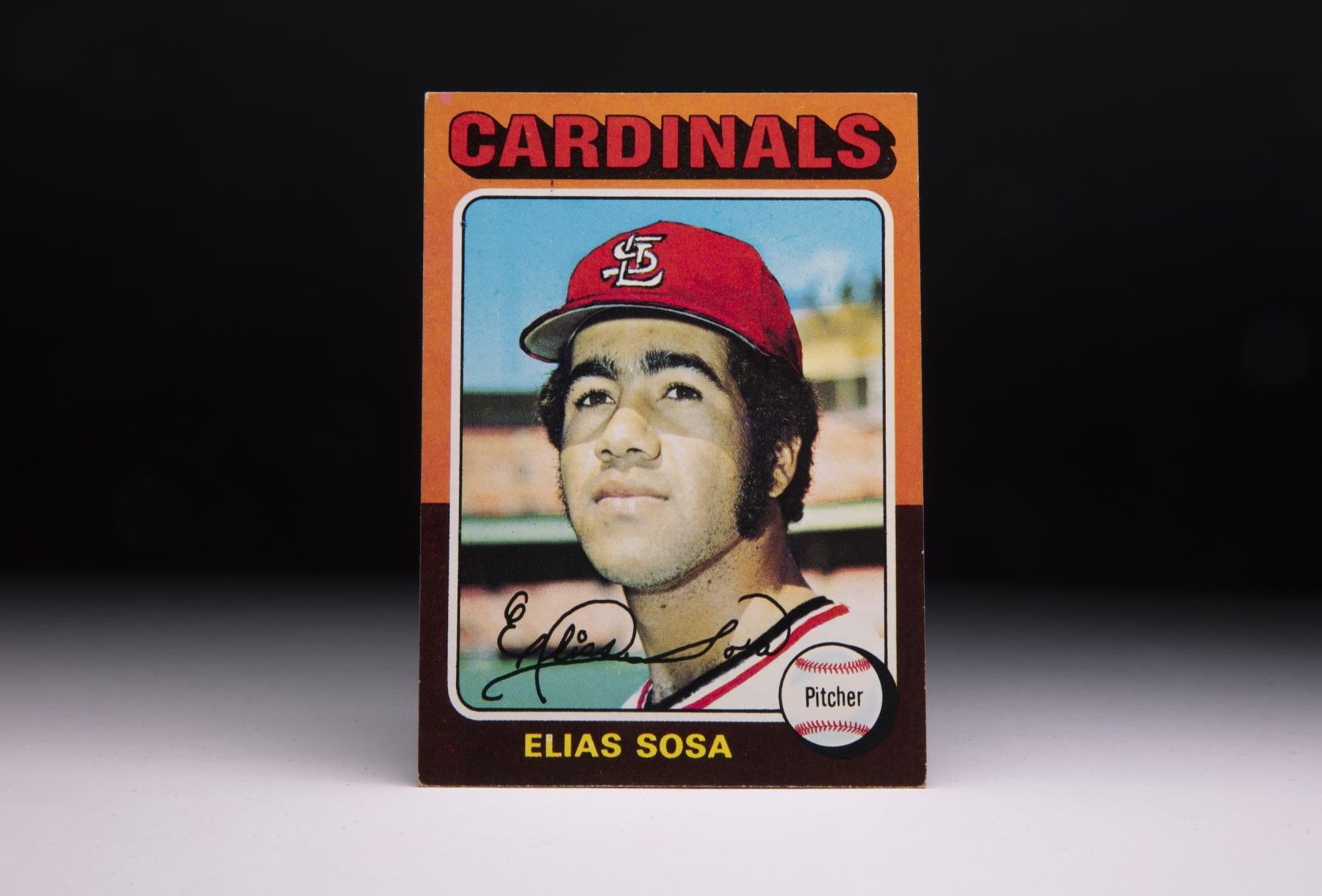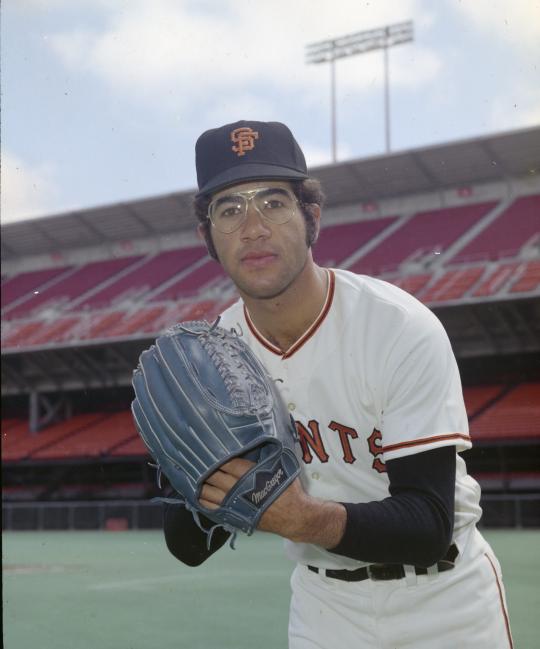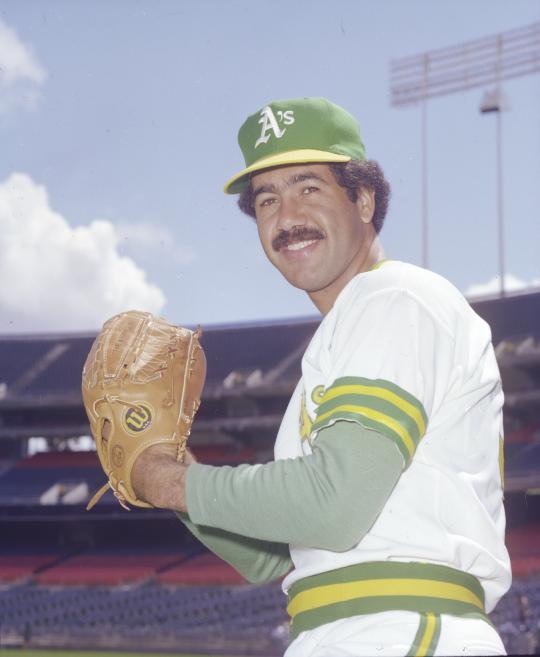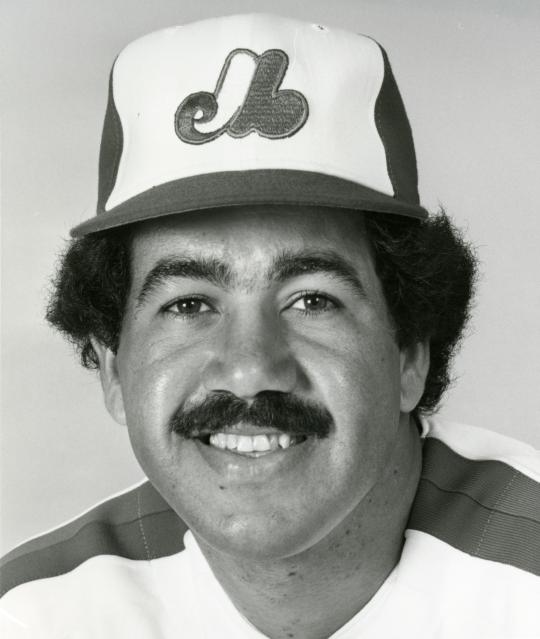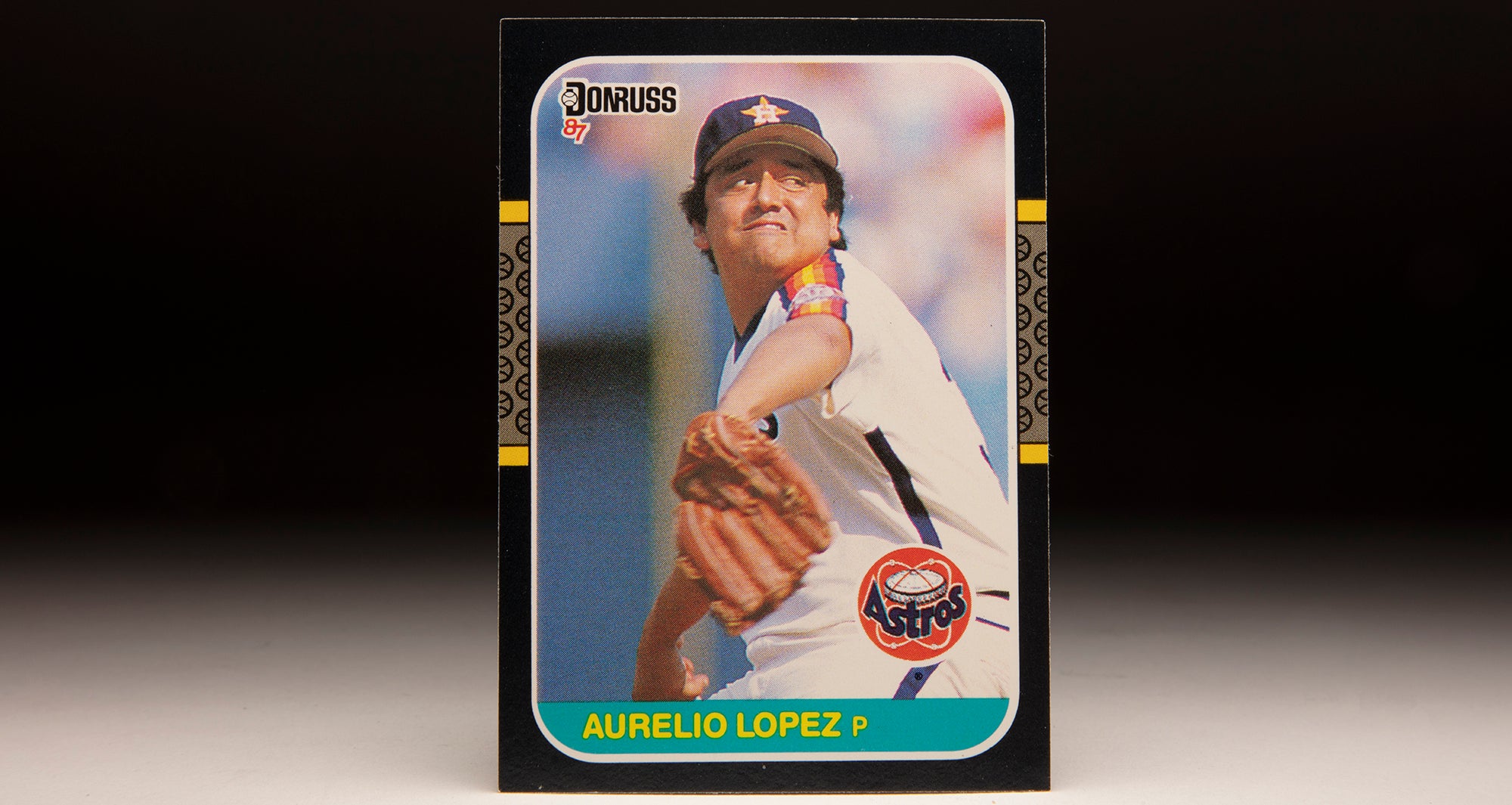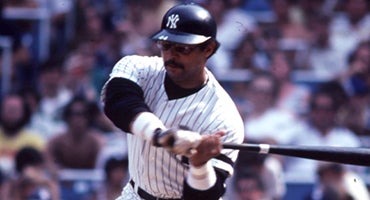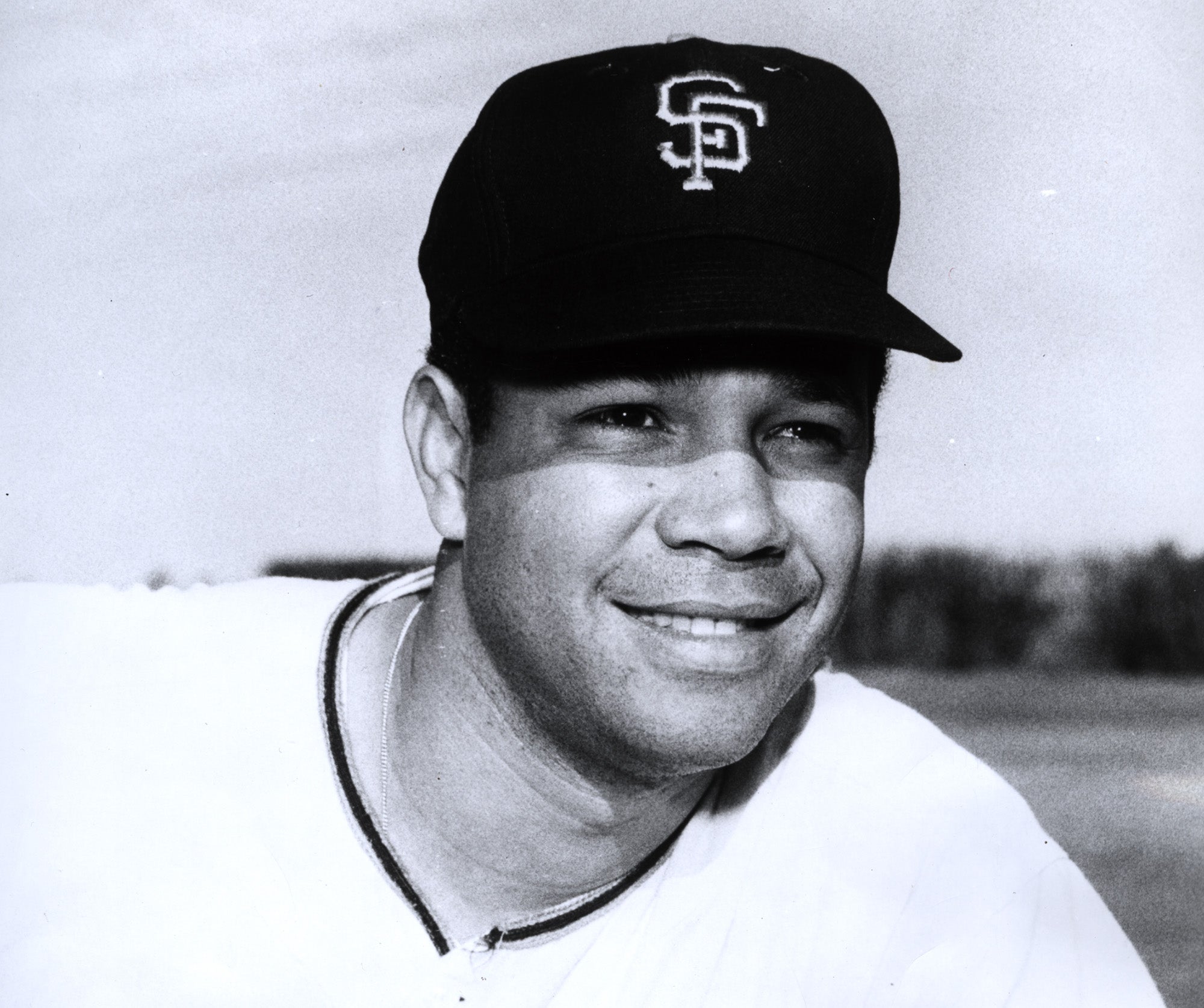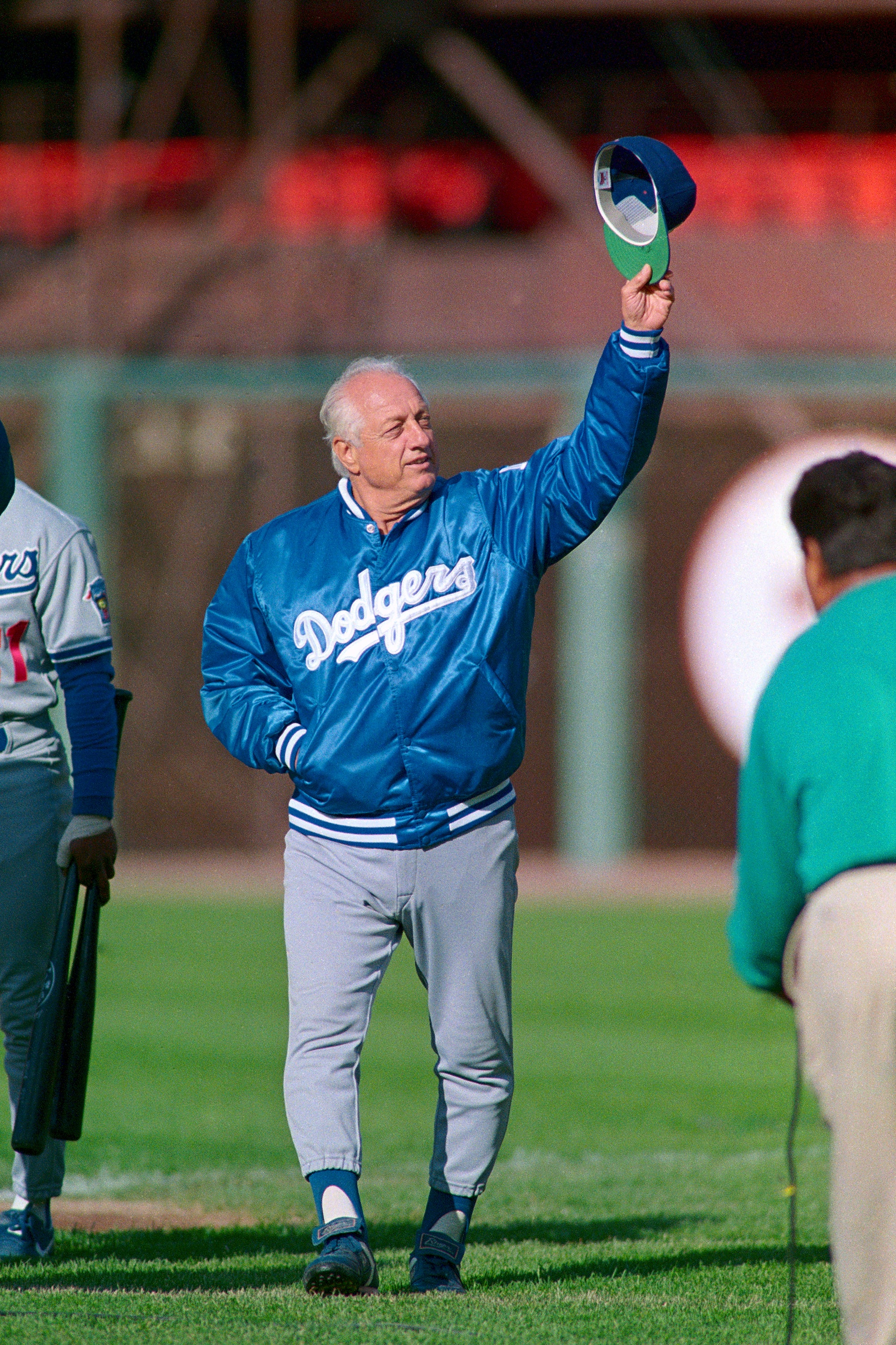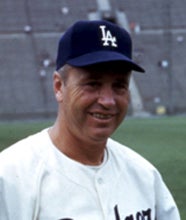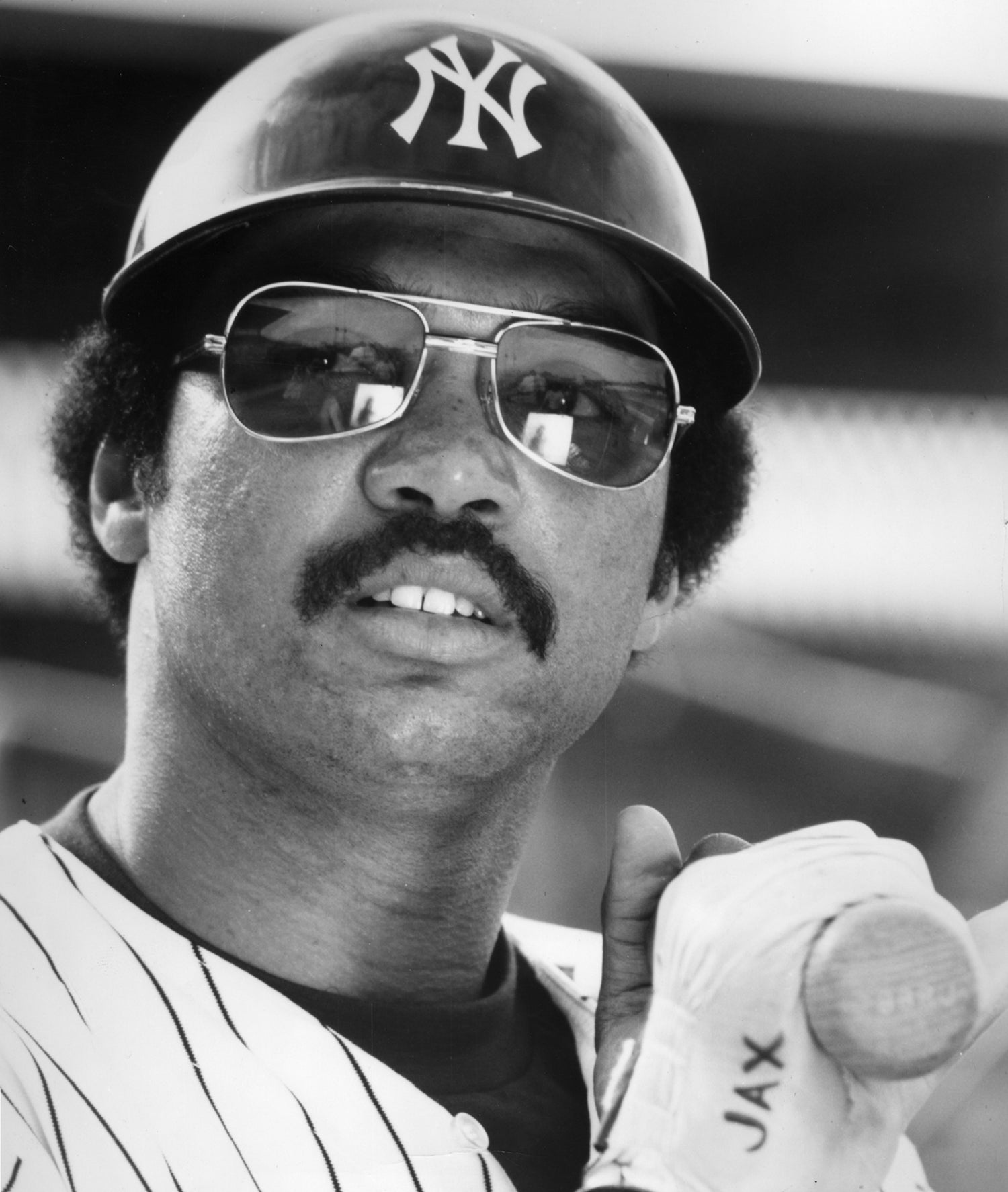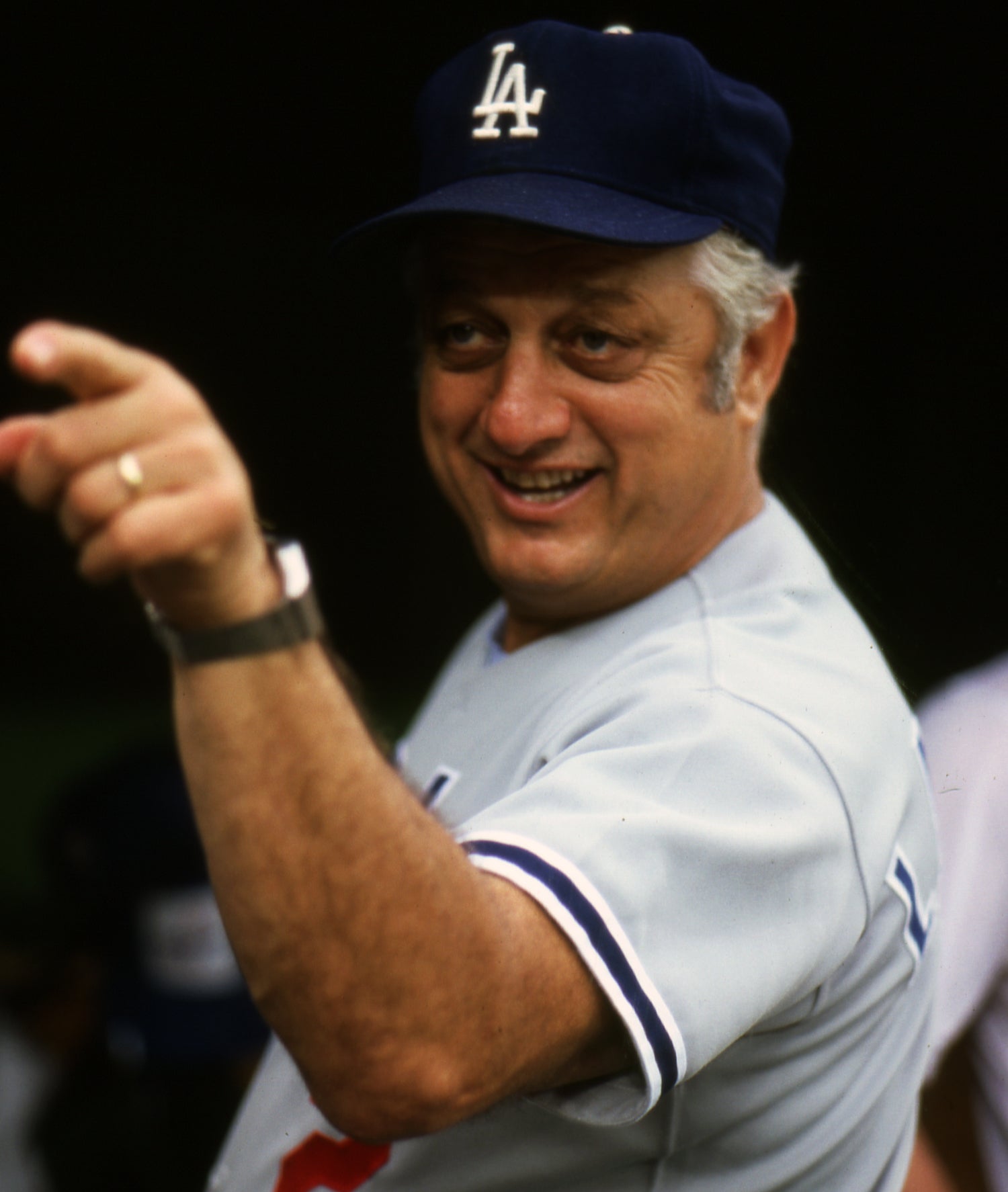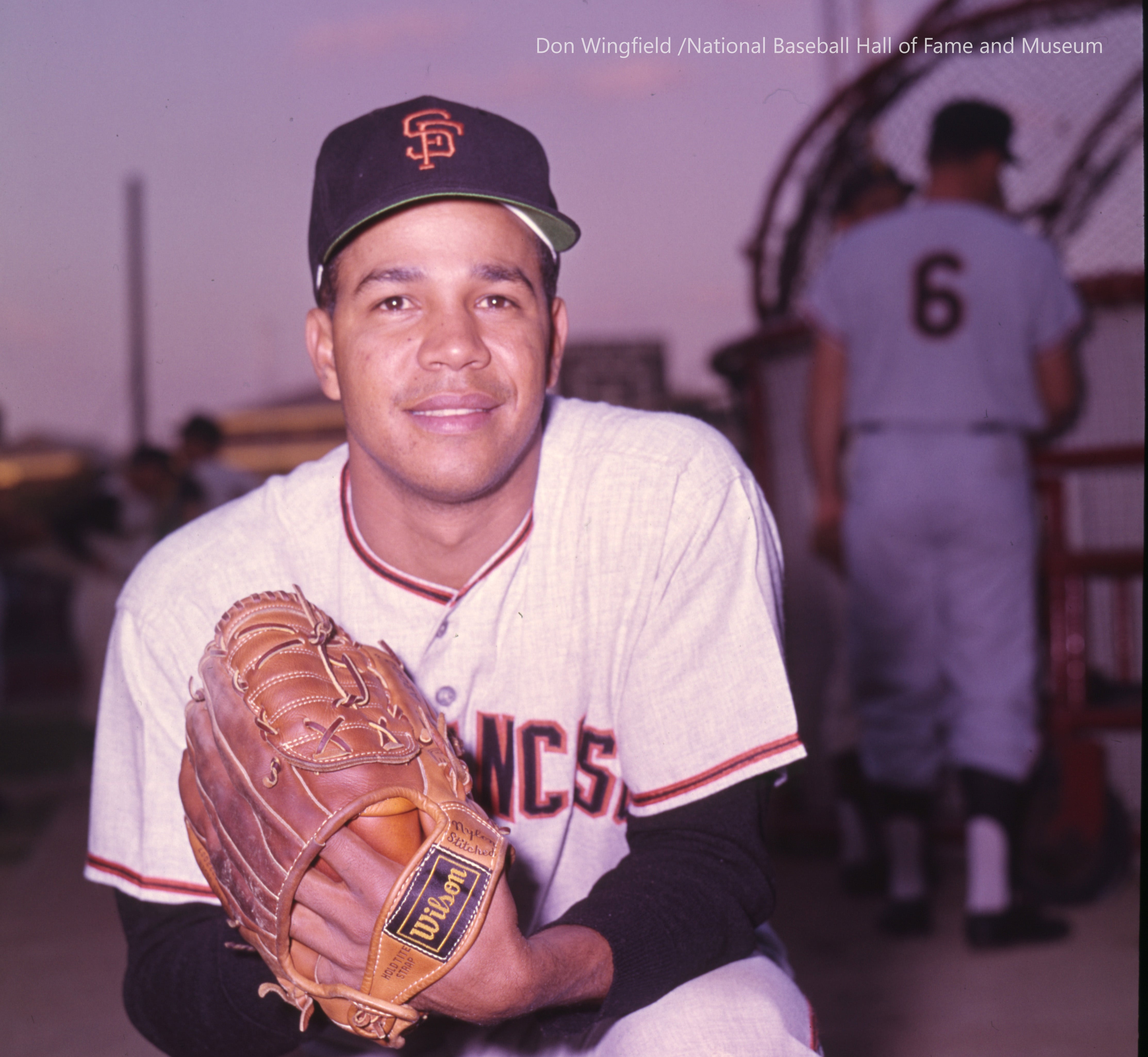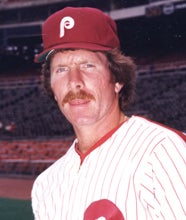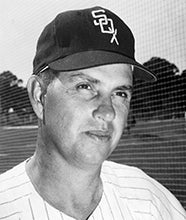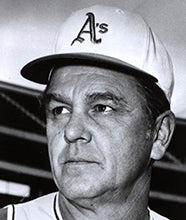- Home
- Our Stories
- #CardCorner: 1975 Topps Elias Sosa
#CardCorner: 1975 Topps Elias Sosa
Elias Sosa will forever be linked to one of the most memorable games in World Series history, having surrendered Reggie Jackson’s second of three home runs in Game 6 of the 1977 Fall Classic.
But Sosa, the seventh native of the Dominican Republic to pitch in the AL or NL, was much more than a big league footnote. For 12 seasons, the durable reliever was one of the most reliable bullpen arms in the game.
Born June 10, 1950, Sosa grew up in Bonao, a city located about an hour northwest from the Dominican Republic capital of Santo Domingo.
“Playing in the major leagues was my dream,” Sosa told the Oakland Tribune during his first full big league season in 1973. “But I thought it would be impossible.”
Sosa didn’t own a baseball glove until he was 13 years old. But his strong right arm drew the attention of Giants scout Horacio Martínez, who helped Sosa develop a high leg-kicking delivery like his hero and fellow countryman Juan Marichal. Martínez then signed Sosa to a contract on March 4, 1968.
Sosa struggled in his first two years in the minors, posting a combined 0-8 record with a 6.04 ERA for teams in the Pioneer League and the Midwest League. He spent most of the 1970 season with Class A Fresno, going 6-8 with a 5.12 ERA but showing his potential by striking out 95 batters in 102 innings.
Returning to Fresno in 1971, Sosa harnessed his talent and went 12-9 with a 3.32 ERA – earning honorable mention notice on the California League All-Star team and finishing second in the league in ERA. In 1972, the Giants promoted Sosa all the way to Triple-A Phoenix and moved him to the bullpen, where he was 10-2 with four saves and a 2.93 ERA in 55 games.
The Giants brought Sosa to the big leagues in September, and he made his debut on Sept. 8 vs. the Astros. In eight games that month, Sosa posted three saves and a 2.30 ERA.
Sosa’s performance in 1972 earned him an invitation to the Giants’ Spring Training camp in 1973. He didn’t figure to make the team until Jerry Johnson, the Giants’ top reliever during their 1971 NL West-winning season, became embroiled in a contract dispute and was eventually claimed by Cleveland on waivers. That opened up a spot for Sosa.
“He can throw strikes,” Giants manager Charlie Fox told the Daily Independent Journal about Sosa, “and that’s what relief work is all about.”
Relying mainly on his sinking fastball, Sosa made the Opening Day roster and was 4-0 with two saves and a 1.75 ERA by the end of May.
“It’s a big chance for me,” Sosa said. “I know I can do the job.”
Sosa endured a couple rocky outings in June but rebounded with a win and five saves in August and another three wins and four saves in September. He finished the year working in 71 games with a 10-4 record with 18 saves and a 3.28 – a mark that would have stood at 2.47 if not for two outings, including his only start of the year where he allowed 11 earned runs over five innings in June. His 71 games pitched tied the Giants franchise record set by Hoyt Wilhelm in 1952.
Following the season, Sosa finished in a three-way tie with Bob Boone and Dan Driessen for third place in the NL Rookie of the Year voting.
Sosa, as usual, pitched in the Dominican Winter League following the season. But even at the age of 23, Sosa knew that overuse could shorten his career.
“I’ll do anything they ask, pitch until my arm drops off,” Sosa told the San Francisco Examiner in the spring of 1974. “Still, you can’t pitch effectively if you have to work every other day.”
But Sosa’s workload was about the same in 1974, as he appeared in 68 games while going 9-7 with six saves and a 3.48 ERA. Then, with the Giants in need of a catcher, San Francisco sent Sosa and backup receiver Ken Rudolph to the Cardinals for prospect Marc Hill on Oct. 14, 1975.
“Our first consideration in strengthening our club for 1975 was relief pitching,” Cardinals director of player personnel Bob Kennedy told the Sacramento Bee. “When we had the opportunity to make the trade we hesitated, but in the final analysis we put pitching needs first.”
But Sosa had a rough first few weeks of the season, leading the Cardinals to turn to Al Hrabosky as their primary reliever. On May 28, the Cardinals sent Sosa and Ray Sadecki to the Braves for Ron Reed and a player-to-be-named-later that turned out to be Wayne Nordhagen.
Sosa finished the 1975 season with a 2-5 record, two saves and a 4.32 ERA over 57 games. He struggled to start the 1976 campaign as well and was working on a 5.35 ERA on June 23 when the Braves sent him and Lee Lacy to the Dodgers in a deal for former Cy Young Award winner Mike Marshall.
It turned out to be a trade that would propel Sosa back into the upper echelon of relievers.
Sosa was used sparingly by Dodgers manager Walter Alston for the rest of that season, as Los Angeles relied on a deep starting rotation and knuckleballing reliever Charlie Hough. But when Tommy Lasorda took over following Alston’s retirement, Sosa became one of the Dodgers’ most trusted bullpen arms. He appeared in 44 games in 1977, going 2-2 with a save and a 1.98 ERA as Los Angeles won the NL West title. Lasorda turned to Sosa with great frequency down the stretch, and Sosa allowed just two earned runs over his final 18 appearances of the regular season.
Sosa was also the subject of a story told by comedian Don Rickles, where Rickles – a friend of Lasorda – was in uniform and was sent to the mound by Lasorda to remove Sosa from a late-season game after the Dodgers had already clinched the division title.
“I didn’t say anything to the media,” Lasorda told the Los Angeles Times in 2011, “I had already been fined $500 for making Tony Danza our batboy.”
Sosa appeared in two games in the NLCS vs. the Phillies, taking the loss in Game 1 after giving up two runs in the ninth inning – one on a single by Mike Schmidt and another on a balk – and then being touched up for two more runs (one earned) in two-thirds of a frame in Game 3. But the Dodgers advanced to the World Series.
“(Schmidt) hit a good, good slider,” Sosa told Knight-Ridder News Service after Game 1. “Down and away. That’s where I wanted it. You’ve got to give credit to him.”
Sosa pitched two-thirds of a scoreless inning in Game 1 vs. the Yankees, extinguishing a New York rally in the eighth to keep the score 3-2 in favor of the Yanks. Los Angeles then tied the score in the ninth on a pinch-hit single by Lacy, who was batting for Sosa. But the Yankees went on to win the game in 12 innings.
Sosa did not appear again until Game 6, when he entered in the bottom of the fourth after Jackson’s first home run chased Burt Hooton and gave the Yankees a 4-3 lead. Sosa then allowed a double to Chris Chambliss and a sacrifice fly by Lou Piniella to give New York a 5-3 advantage.
Then in the fifth with Willie Randolph on first and one out, Jackson smashed a line drive off Sosa that whizzed over the right field wall at Yankee Stadium to give New York a 7-3 lead.
Lasorda pulled Sosa at that point, and the Yankees went on to win 8-4 – with Jackson homering again in the eighth off Hough.
“We were supposed to keep the ball in on him,” Lasorda told United Press International about Jackson after Game 6. “We tried to pitch him in a certain area and we didn’t get it there. It’s gotta be the greatest performance I’ve ever seen in the World Series.”
The Dodgers and the Yankees both returned to the World Series in 1978 but Sosa was not part of the festivities. Los Angeles signed free agent reliever Terry Forster following the 1977 season, and Sosa asked for a similar contract. When terms could not be reached, the Dodgers sold Sosa’s contract to the Pirates on Jan. 31, 1978.
“I’m glad to be with the Pirates, but the Dodgers did it real dirty to me,” Sosa told the Bradenton (Fla.) Herald in the spring of 1978. “What I was looking for was a better chance, but they wanted to sign me for one year. They wanted to keep me on the club for cheap money.”
Sosa appeared to be in line for regular work with the Pirates, who lost both Forster and Goose Gossage via free agency following the 1977 season. But on April 4, 1978 – three days before the start of the regular season – the Pirates traded Sosa, Miguel Diloné and Mike Edwards to the Athletics in exchange for catcher Manny Sanguillén, a longtime Pirates standout who returned to Pittsburgh after spending the 1977 campaign in Oakland.
The Athletics won just 69 games in 1978 but Sosa was excellent, going 8-2 with 14 saves and a 2.64 ERA over 68 games. He became a free agent following the season and was selected by the maximum 13 clubs in the re-entry draft.
On Jan. 8, 1979, Sosa signed a five-year deal with the Expos worth a reported $1.2 million.
“The Expos were my team because here I feel that I am joining a club that has a good shot at winning the pennant,” Sosa told United Press Canada. “I’m confident I can do the job and that’s why I was looking for the security I got here.”
Sosa lived up to his contract in 1979, going 8-7 with 18 saves and a 1.96 ERA for a Montreal team that stayed in the NL East race until the final week. Sosa battled inconsistency in 1980, however, as Woodie Fryman took his spot as the team’s closer. Sosa finished the year with a 9-6 record, nine saves and a 3.07 ERA over 67 games as the Expos once again fell just short of the division crown.
In 1981, Montreal finally reached the postseason – but Sosa was often not in the mix of late-inning options as manager Dick Williams used Fryman, Bill Lee and newly acquired Jeff Reardon before being fired in September and replaced with Jim Fanning.
Montreal defeated the Phillies in the NLDS in five games – with Sosa appearing in Games 3 and 4, both Expos losses. Then in the NLCS vs. the Dodgers, Sosa appeared only in Game 4, pitching a third of an inning. The Expos lost in five games – and Sosa would not pitch in the postseason again.
On March 30, 1982, the Expos sold Sosa’s contract to the Tigers, who were looking for relief help because of a back injury to Aurelio López.
“I haven’t seen (Sosa) pitch in a while, but I know he throws everything hard,” Tigers pitching coach Roger Craig told the Associated Press. “I also know he can take the ball a lot. He can throw almost every day if need be.”
Sosa never found his groove in Detroit, however, going 3-3 with four saves and a 4.43 ERA over 38 games. The Tigers then sold his contract to the Padres on Oct. 7, 1982, reuniting Sosa with Dick Williams, who had become the Padres manager following the 1981 season.
Sosa spent the 1983 campaign in mostly mop-up roles, going 1-4 with a save and a 4.35 ERA over 41 games. With his five-year deal now expired, Sosa found few offers in free agency and went to Spring Training with the Giants as a non-roster player. When the Giants did not add him to their Opening Day roster, Sosa’s career was apparently over.
He attempted a comeback in 1987 with the San Jose Bees of the California League but appeared in only three games. Then in the fall of 1989, Sosa pitched for the St. Petersburg Pelicans of the Senior Professional Baseball Association, helping that team win the championship in the only completed season of the league.
He worked for several big league teams after his retirement, instructing young pitchers. He finished his career with a 59-51 record, 83 saves and a 3.32 ERA in 601 games. At the time of his last big league game, Sosa held the record for most games by a pitcher born in the Dominican Republic.
“To me, the first thing a relief pitcher needs is the heart,” Sosa told the San Francisco Examiner. “Then, then ball. Good stuff is important. You can’t succeed without it. And then you must have courage.”
Craig Muder is the director of communications for the National Baseball Hall of Fame and Museum

